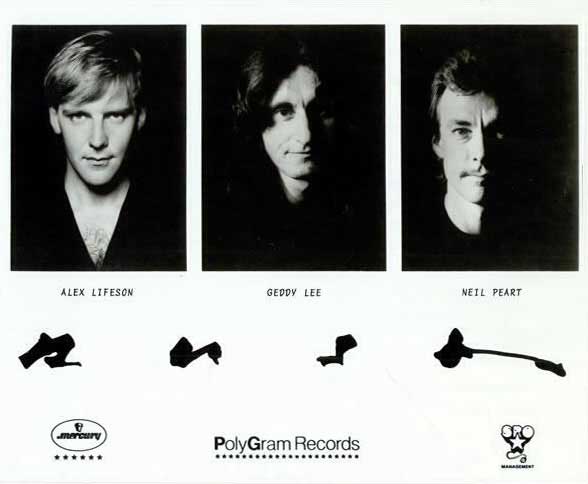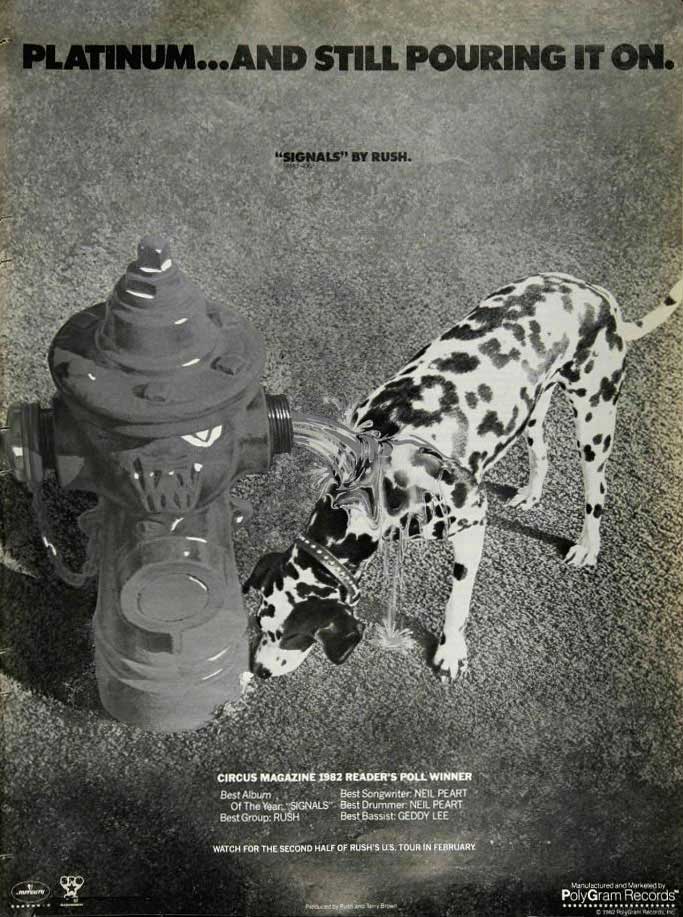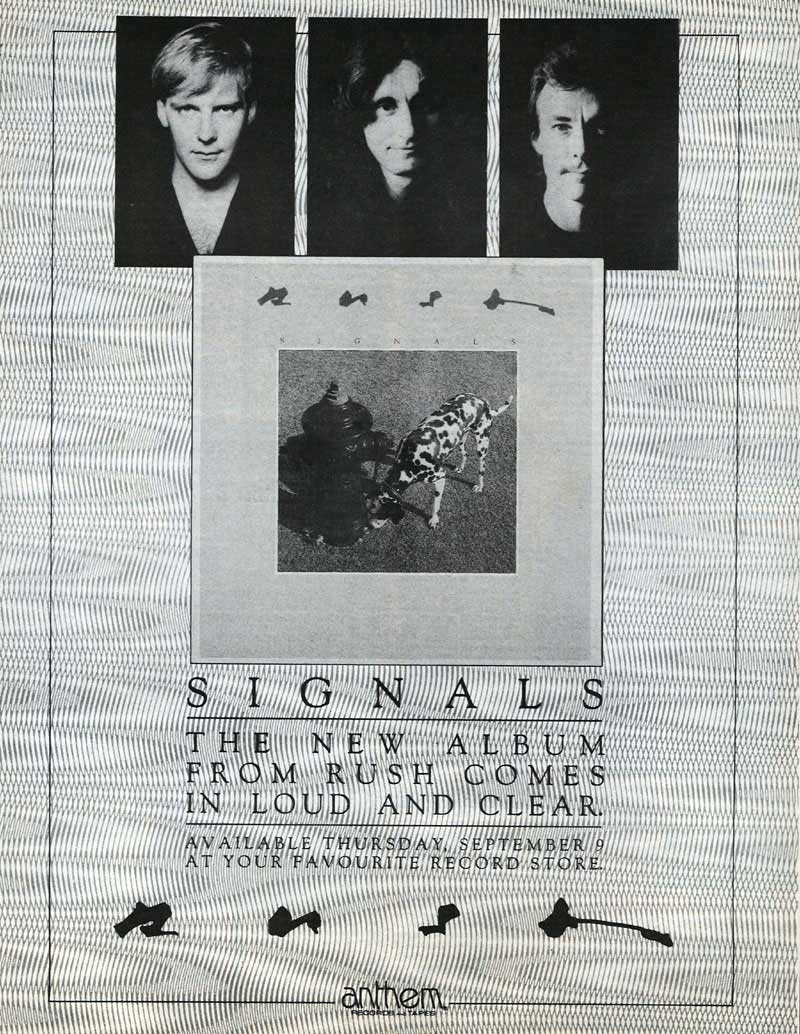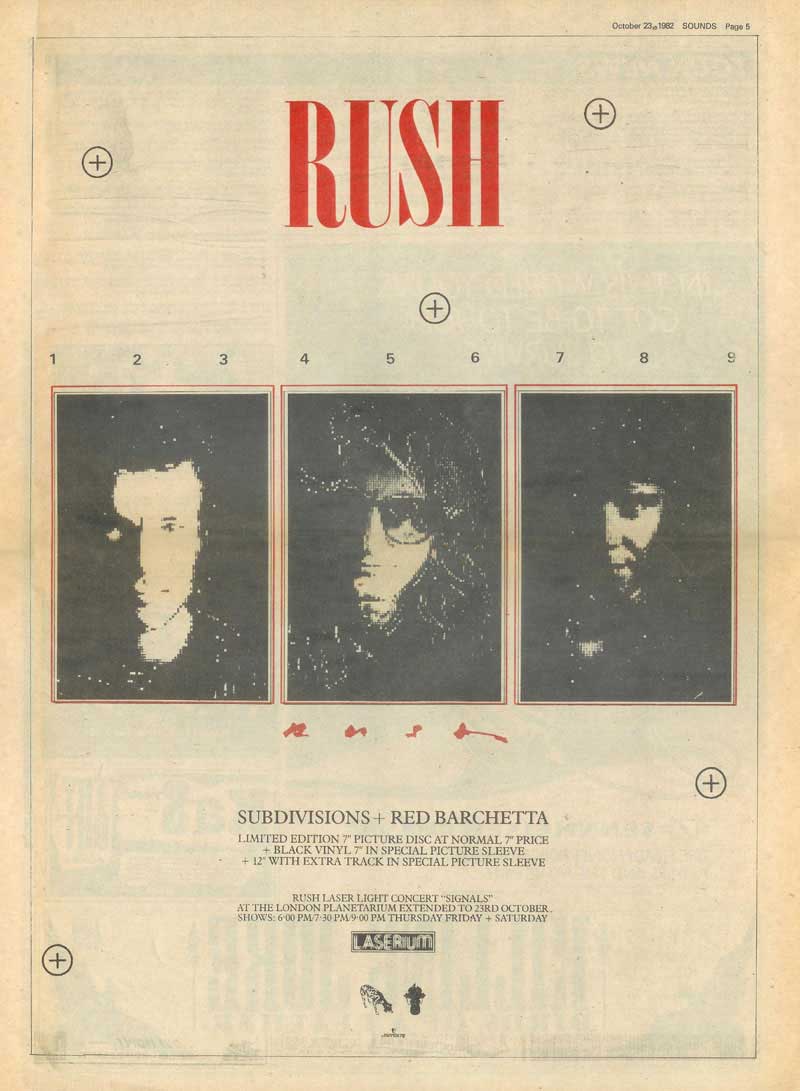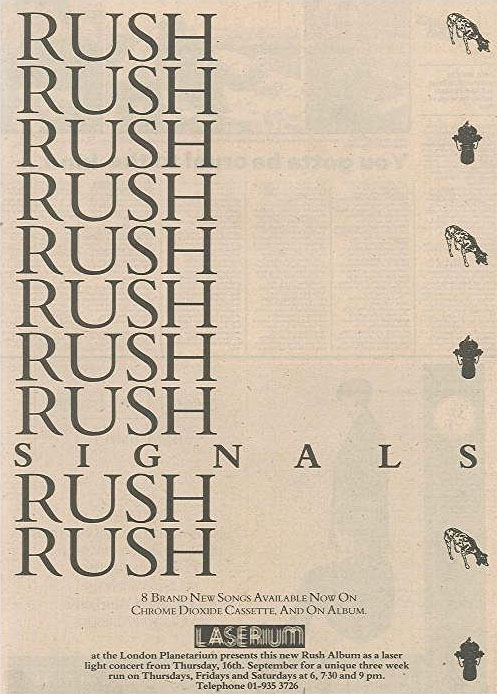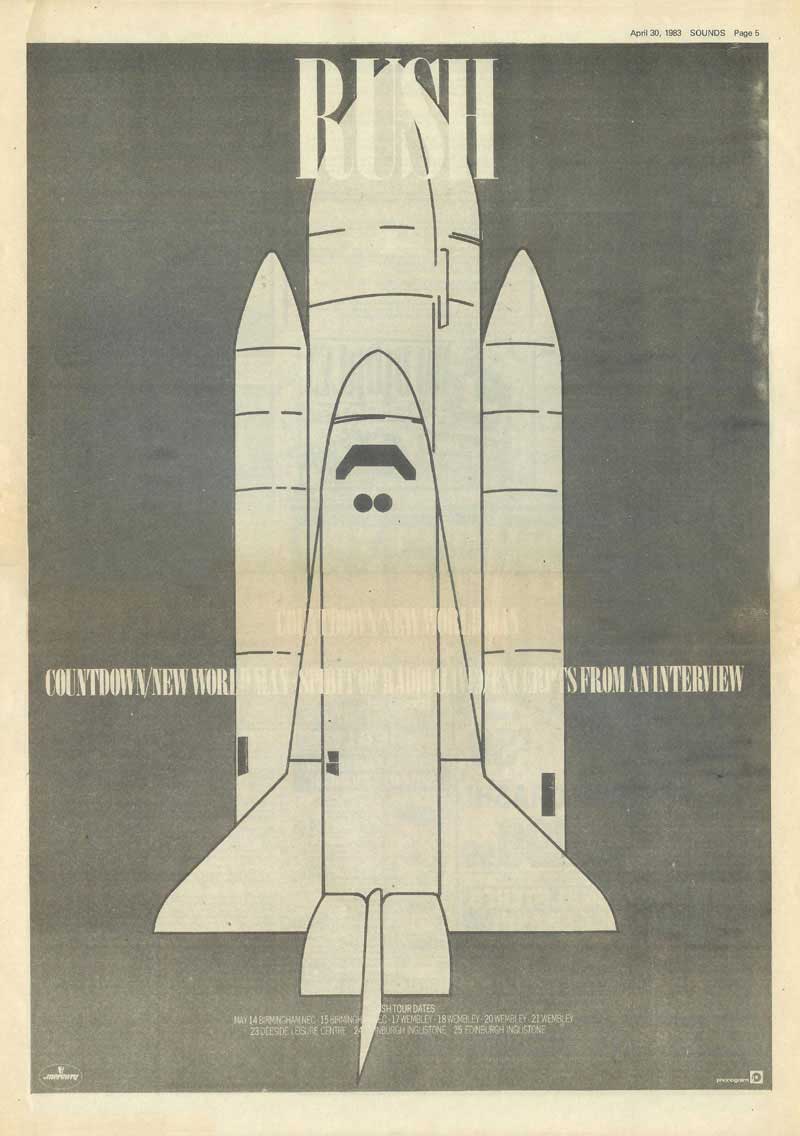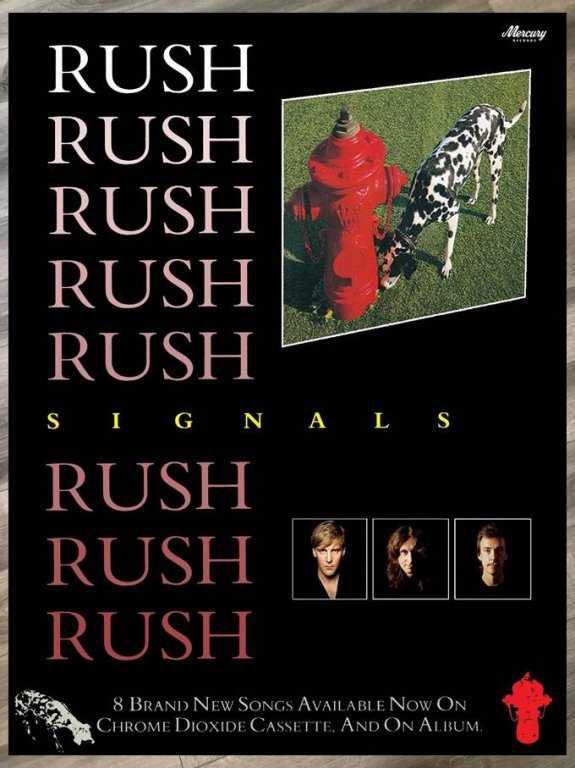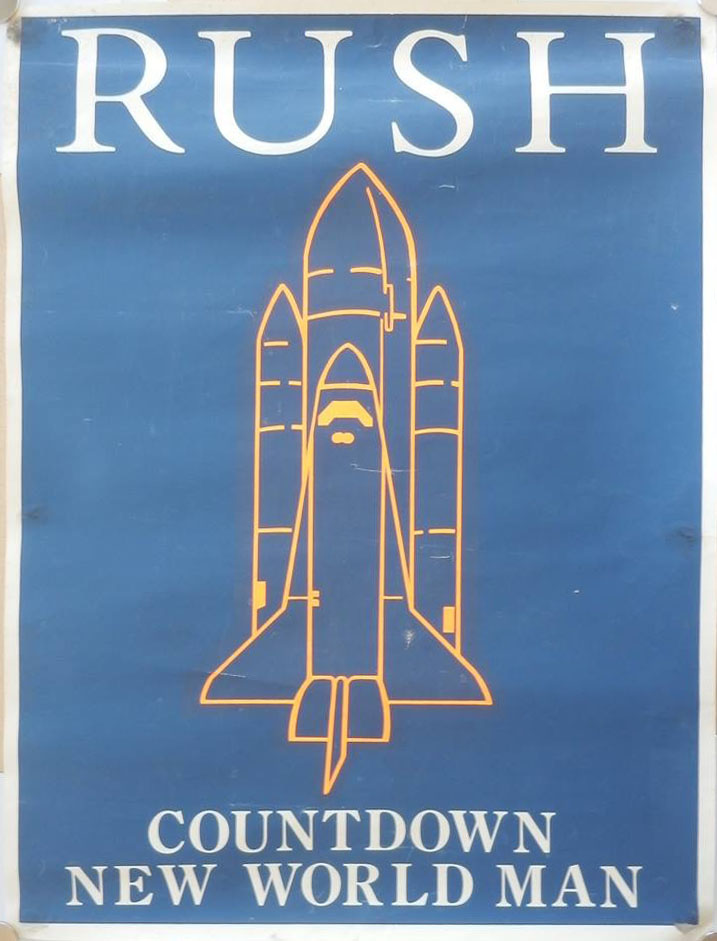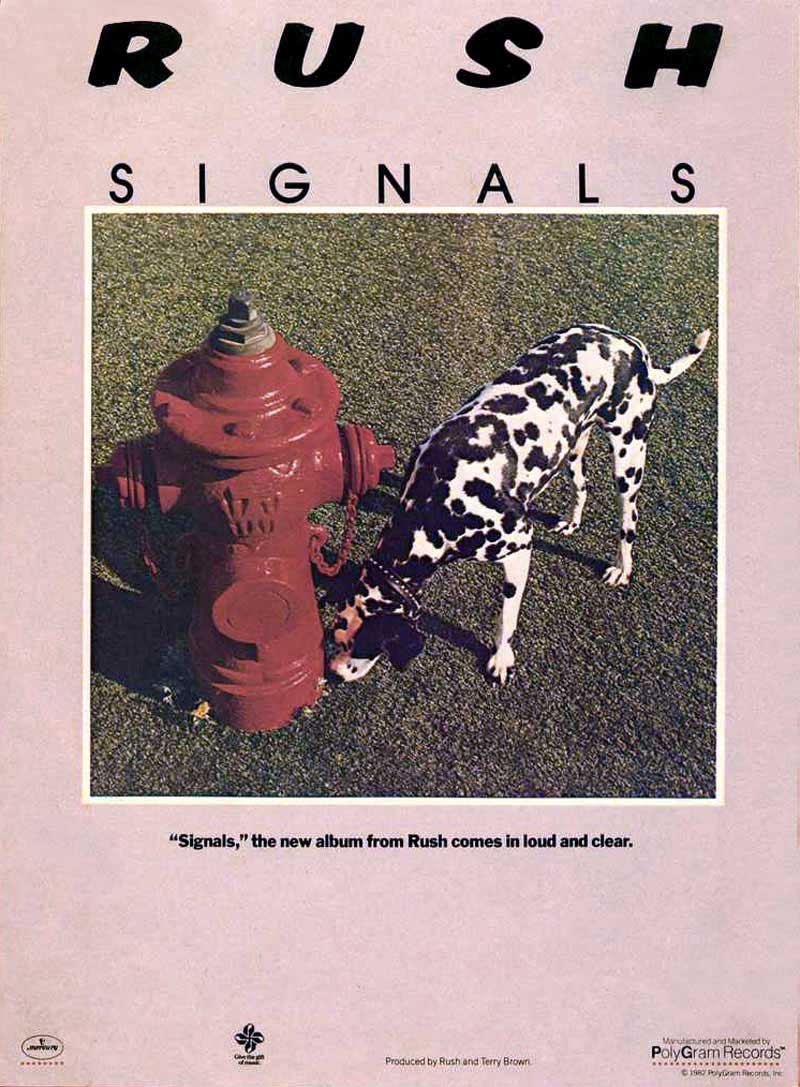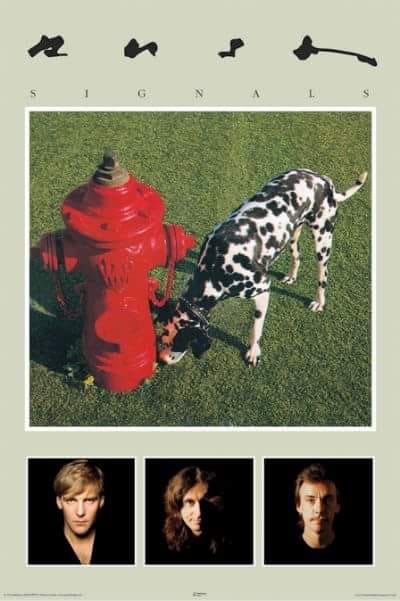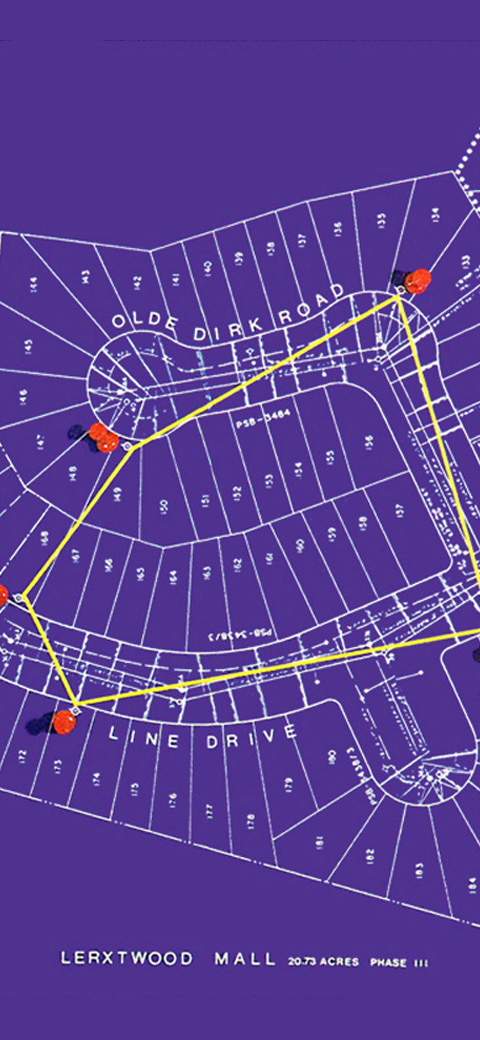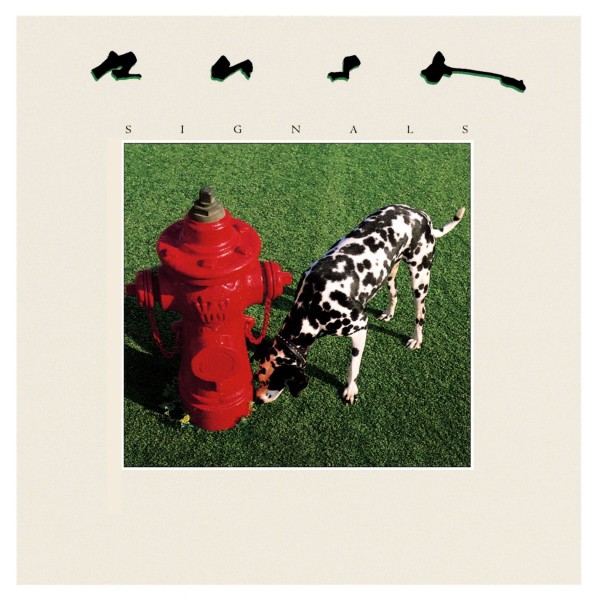
Subdivisions (5:33)
The Analog Kid (4:46)
Chemistry (4:56)
Digital Man (6:20)
The Weapon (Part II of Fear) (6:22)
New World Man (3:41)
Losing It (4:51)
Countdown (5:49)
Geddy Lee:
Bass guitar, synthesizers, vocals, Pitcher
Alex Lifeson:
Electric and acoustic guitars, Taurus pedals, First Base
Neil Peart:
Drums and percussion, Third Base
Produced by Rush and Terry Brown, Left Field
Arrangements by Rush and Terry Brown
Recorded and mixed at Le Studio, April, May, June, and July 1982
Engineered by Paul Northfield, Centre Field (a regular Albert One-Stone)
Assisted by Robbie Whelan Right Field
Digitally mastered by JVC
Special guest performance by Ben Mink, electric violins on Losing It, appears courtesy of FM
Art direction, graphics, and cover concept by Hugh Syme
Photography by Deborah Samuel
Compact disc redesigned by Stve Kleinberg
Hydrant courtesy of the Department of Public Works, TORONTO
Management by Ray Danniels, SRO Productions, TORONTO
Executive Production by Moon Records
Road Manager and Lighting Director: Howard Ungerleider
Concert Sound Engineer: Jon Erickson
Stage Managers: Nick Kotos and Liam Birt, Shortstop
Stage Right Technician and Crew Chief: William B. Birt
Stage Left Technician: Skip Gildersleeve
Centre Stage Technician: Larry Allen, Coach and Catcher
Guitar and Synthesizer Maintenance: Tony Geranios Second Base
Stage Monitor Mixer: Steve Byron
Concert Security: Ian Grandy
Concert Projectionist: Lee Tenner
Personal Shreve-of-all Trades: Kevin Flewitt
Concert Sound by National Sound: Tom Linthicum, Fuzzy Frazer, and Dave Berman
Concert Lighting by See Factor International: Nick Kotos, Mike Weiss, Jeffrey Thomas McDonald, Mark Shane
Busheads and Truckfaces: Tom Whittaker, Billy Barlow, Lance Vaughn, PatLynes, Arthur MacLear, Red McBrine, Bob Hoeschel
Most Valuable Persons: At Le Studio; André, Yaël, Paul Robbie, Richard, Solange, Nancy, Lina, Awesome André Moreau and Michel; Al, Pat, Jill, and Maria at The Baldwins; The Embers at Settlers Bay; Warren Cromartie and the Montreal Expos'; Intellivision Baseball; The Ziv Orchestra; Trevor and the Commons Hotel; Trevors Tramps (34-15); the Griffin family and the people of NASA; Mr. O. Scar for pre-production work; Bill Churchman; all the Oak Manoroids at SRO
Special Awards for Technical Assistance: John Kaes and See Factor, Ted Veneman, Richard Ealey, Ron Shaughnessy, the Music Shoppe TORONTO, the inflationary Ted McDonald, the Percussion Centre FORT WAYNE, Tama drums, Avedis Zildjian cymbals
A fond farewell and best wishes to Michael Hirsh and Greg Connolly
© 1982 Mercury Records © 1982 Anthem Entertainment
Notes
- Mercury/Polygram, September 9, 1982
- Highest Billboard Chart Position: 10 - Certified Gold & Platinum by RIAA: November 10, 1982
- Reissued October 11, 1994 by Mobile Fidelity Sound Labs on Ultradisc II-24 KT Gold CD.
- Reissued August 14, 2015 by Universal Music Enterprises on Blu-Ray Pure Audio version with 96kHz / 24-bit 5.1 surround sound and stereo.
- Reissued October 9, 2015, on 200-gram, heavyweight vinyl with a download code for a 320kbps MP4 vinyl ripped Digital Audio album as well as high resolution Digital Audio editions in DSD (2.8mHz), 192khz / 24-bit, 96kHz / 24-bit.
- Reissued April 28, 2023 as the Signals 40th Anniversary Edition in various packaging options which includes the original album remastered by Abbey Road Studios in 2015.
- The Subdivision picture disk was released as a 7" vinyl single in 1982, with Red Barchetta as the b-side.
- The Countdown picture disk was released as a die cut 7" vinyl single in 1982, with New World Man as the b-side.
- There are two versions of "The Weapon" which vary from the album version: the 12" single includes a Count Floyd spoken intro and abbreviated guitar solo, while the Mobile Fidelity Sound Labs release is missing the lyrics "and the things that he fears, are a weapon to be held against him...." from the second chorus at 3:13. As quoted in the Rush FAQ, Mobile Fidelity Sound Lab stated "The master tapes, which were provided to us directly from the Rush offices in Canada, did not include these vocals. Apparently, these vocals were edited in at a later time."
- Laserium premiered Signals in a one-hour laser show featuring the complete album in planetariums across North America, as well as in London, England, on September 6, 1982. Running for three weeks, the Rush laser show also marked the first time Laserium featured a complete show of one group's material simultaneously with entirely new visuals.
- Long believed to be the 'spoken voice' in "Subdivisions", Toronto newscaster Mark Dailey himself stated in 2009 that this is an "urban myth":
"That's been an urban myth for years. It's not my voice on 'Subdivisions' by Rush but I continue to get credit. I've tried to dispel it but won't go away." - Mark Dailey, Citytv.com, March 23, 2009
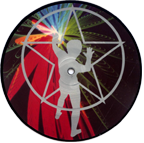
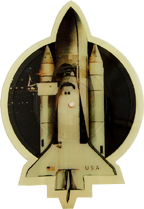
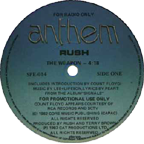
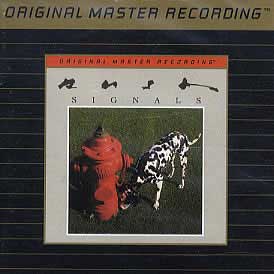
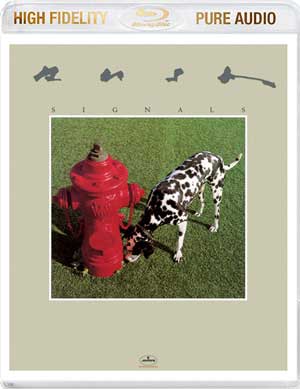
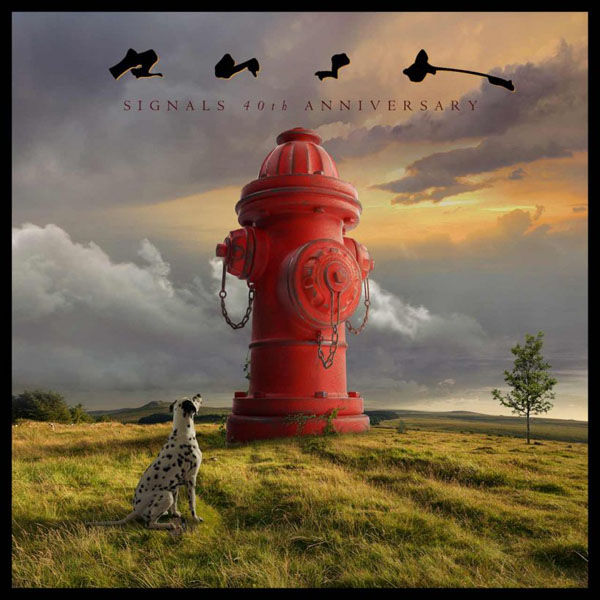
Neil Peart later confirmed in 2010 that he himself in fact provided the voice when discussing Jacob Moon's cover of "Subivisions" at Rush's induction into the Canadian Songwriters Hall of Fame earlier this year:
"We all shared Jacob Moon's performance of Subdivisions quite a long time ago and sent it to each other, 'Hey have you seen this?' because it's such a beautiful cover. The imaginative way that he uses the little cassette player to get my voice in there. It's superb." - Neil Peart, Jam!Showbiz, March 26, 2010
In Their Own Words:
[Signals has a cyclical framework. It opens in suburbia, on the edge of "the far unlit unknown," contemplates escape in The Analog Kid, explores universal human imponderables - the essence of our humanity, sex, religion, old age - and ends with actual escape to the stars in Countdown...] "Ah, you noticed that. We were hoping no one would. It's so unfashionable these days to construct grand concepts. We're being closed mouthed about it. Some people, and I don't expect there'll be many, will be insightful enough to catch it. Although it's interesting that you, the first writer I've talked to about the album, did pick up on it". - Neil Peart with Greg Quill, Music Express, September/October 1982
"The summer before I turned fifteen, my family camped outside Montreal to visit the World's Fair, Expo '67, and at the campground, I met a girl from Ohio. Her father was extremely watchful (warning her that Canadian boys had 'Roman hands and Russian fingers'), and we never even kissed, but I fell hopelessly in fourteen-year-old love...I always remembered her ('the fawn-eyed girl with sun-browned legs' in the song 'The Analog Kid')". - Neil Peart, Roadshow
"[Digital Man] sort of came out of a sort of a little bit of personal comedy. We had the title way before we had a concept. There was a guy who we hired, I think it was on Moving Pictures, to bring all this digital equipment so that we could master the album digitally, and he was a sort of a 'strange' example of modern man, without going into too much detail. We were sitting around talking, and Le Studio had gotten their own digital equipment, so there was really no need to hire our digital man this time. And we were trying to figure out beds, you know, bed assignments, how many guys in the crew we could take to the house near Le Studio, because the situation is you live right on the premises. So somebody came out with the phrase 'Well I guess we won't need a bed for the digital man' and everybody went (snaps his fingers) 'Fantastic!' So we wrote it down and Neil developed a whole concept about modern man and the sort of transience of modern man in the sort of society that we're living in. That sort of spurred the tune and the feel for the tune but it sort of represents technology getting to a certain point, the ease that one can float from one part of society to another, and one part of the world to another." - Geddy Lee, Innerview with Jim Ladd, 1983
"We decided to write another song...So, thus was born 'Project 3:57'! [aka New World Man] In order for another song not to cause great inequality between the length of the two sides, and not to cause us trouble in the mastering of the album, it had to be under four minutes. We decided to play this one fast and loose, writing it in one day and recording it the next! We wanted to capture a spontaneous, relaxed feel for this one, not even spending much time getting the sounds together. Thus, it could stand in contrast to the rest of the album, being much more raw and 'live' in its affect. Two days is very close to a record for us to write and record a song." - Neil Peart, "Stories From Signals"
"'New World Man' was the very last thing we recorded for the album. We were determined to get as much music as we could on each side of the record, and after we had finished working on everything, we discovered that the record ran about four minutes short. So we sat down in the studio and began playing around with ideas to fill up the four extra minutes. We figured if worse comes to worse we could always save ideas for the next album. Geddy said, 'Hey, how do you like this?' And he laid down the bass lick that's the foundation of the song. We had no idea it would be a hit. But we're sure not gonna complain." - Alex Lifeson, Hit Parader, March 1983
"[Chemistry: 'two to one, reflections on the water'] it's a reference to two lovers...it's about love, and the second part of it's about the three of us. It's very simple." - Neil Peart, Feedback! Rock Interviews, July 1983
"With 'The Analog Kid' I'm looking at a period of life that all people go through. The youthful restlessness, that adolescent discontent, and the different ways that people handle it. It looks at a person that's in the throes of choice. What happens after that choice you see so much...again looking at people I know, and people I grew up with, some of them forget that (restless feeling), and other people say 'I feel like I gotta leave, and they go', which is the way I did it. I just said 'I feel restless, I feel like I wanna do something', and I went and did it. Everybody experiences that as an adolescent. It's a very painful and difficult time of life. Everyone experiences the discontent. Some people choose to take the safe way, and say 'no, never mind, I'll just go to college and be an accountant', or 'I'll just go get a job in a factory', take the safe way, the easy way, get married when they're sixteen, and start paying for a car or whatever. It looks at the period before the choice is made. It looks at, to me, what are the important feelings of that time, the sensitivity too of that time; what moves you; I remember myself in that particular time and how sensitive I was to nature and to cities and to people, the whole thing, and that's basically what that was trying to capture." - Neil Peart, Feedback! Rock Interviews, July 1983
"While we were making that record we formed a softball team and those were the positions we played." - Geddy Lee regarding the positions listed in the linernotes, "Rockline", May 21, 1984
"We would all get behind the console and we would all have jobs - turning a knob, pushing a fader at a certain point, those sorts of things. I was sitting there thinking, 'I can't hear guitar.' I'm a very easygoing guy, but I thought, 'This is not right.' So I pushed that fader up. I do remember Terry [Brown] turning to me and smiling and reaching over and pulling it back down. I haven't forgotten that." - Alex Lifeson, PROG, April 2023
Promos
Smartphone Wallpaper
Our RUSH smartphone wallpapers have been modified for a 9:19.5 aspect ratio to fit "most" Smartphones.
This is a collection of transcripts of magazine and newspaper articles and other media related to this release or coinciding with the time frame surrounding it. This is an ongoing work in progress; feel free to email any suggested additions.
